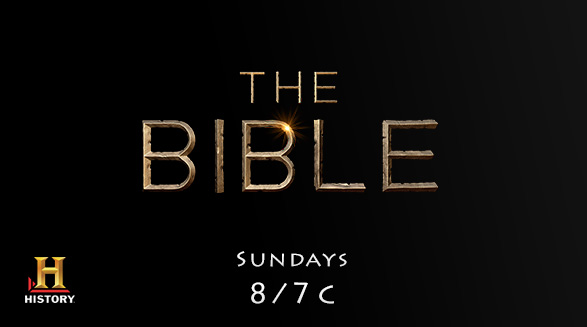Bible Stories vs. The Story of the Bible
 A couple of months ago, my associate pastor, Joe Iovino, and I were invited to a rollout event for the new miniseries “The Bible” on History Channel which premiered this week. On first glance, the series didn’t look like the usual Christian-y kind of film with cheesy production values, lousy acting, and simplistic theology. We left the event with high hopes that this could be something we’d be excited to use as a teaching tool in the church, particularly for those who are more visual learners.
A couple of months ago, my associate pastor, Joe Iovino, and I were invited to a rollout event for the new miniseries “The Bible” on History Channel which premiered this week. On first glance, the series didn’t look like the usual Christian-y kind of film with cheesy production values, lousy acting, and simplistic theology. We left the event with high hopes that this could be something we’d be excited to use as a teaching tool in the church, particularly for those who are more visual learners.
After watching the first episode of The Bible on History Channel, however, I have to admit that it’s really a mixed bag that leaves me somewhat disappointed (Note: as a historian, I am usually disappointed in historical dramas. My nitpicking drives my family nuts!) The production values for the series are ok, the acting is a little better than your typical biblical film, and no film or series can fully capture every story and nuance in the biblical text (unless, of course, it was written by biblical historians–in which case the movie would take as long to watch as the Bible’s own 3,000 year time line!). The main problem, as I see it, is that this “epic miniseries” suffers from the same problem that most people have when they read the Bible itself–the problem of reading Bible stories instead of reading the story of the Bible.
Producers Mark Burnett (Survivor) and Roma Downey (Touched By an Angel), we learned at the promotional event, engaged this project as a nod toward the evangelical Christian market (note the vigorous ad campaign in Christian publications) who will certainly make up most of the viewing audience and purchase the immediately available DVD set as soon as it hits the stores. Given that it’s being aired on the History Channel, one would also expect to focus on the more “exciting” parts of the narrative–the parts where swords and plagues are most prominent. The resulting mix (at least so far) is that we don’t really get the story of the Bible as much as we get a loosely connected set of Bible stories–kind of like Vacation Bible School with better special effects.
A look at the first episode plays this out. The story goes from Adam and Eve (who are both cast as ontological eye candy) to Noah and the flood to Abraham (whose angel visitors wind up being divine ninjas who take out some of the evil Sodomites and Gomorrans with double-bladed martial arts moves) to Moses (nasty plagues and giving the Egyptian army a bath) to Joshua and the conquest of Jericho (the spies going into the city are also Israelite ninjas–is there a secret ninja school we have yet to find out about from the Dead Sea Scrolls?). All of this makes for entertaining television, but the parts that the series skips are actually critically important for the whole biblical story. There’s nothing about Jacob and the identity of Israel and the twelve tribes; nothing about Joseph and the reconciliation that foreshadows what God is doing throughout the Bible; absolutely nothing about Israel struggling in the desert with sin and trying to obey the covenant God has given them. Moses doesn’t argue with God at the burning bush (making him seem more iconic than human), Jacob doesn’t wrestle with God at the riverside, etc., etc. It’s those spaces in between that actually flesh out the story of Scripture and give us the meaning of the text–how God launches the project of redeeming the world through Israel and the thread of covenant that runs through the whole Bible.
The Bible is written as a library of books that, taken together, constitute one metanarrative: the story of Israel which climaxes in the story of Jesus, whose life, death, and resurrection inaugurate the already-and-not-yet inbreaking of God’s rule and reign on the earth. It’s the theology of the Bible that runs through the narrative like a thread and keeps the disconnected stories from simply devolving into a series of interesting moral tales (which is the way most of us learned it in Sunday School). In that sense, The Bible miniseries feels to me a bit like a high tech version of the old flannelgraphs that my Sunday School teachers used to tell us Bible stories when I was a kid. It wasn’t until I went to seminary that I learned how all those stories fit together into one story. Some would argue that the miniseries at least gets people started somewhere. I get that, but I also think that until you have begun to understand the story as a whole, you’ll never make sense of the sum of its parts and you’ll be liable to evoke some really truncated biblical theology along the way.
Having said that, I still think there is some value to watching the series. It will be interesting to see how it unfolds and it’s always fun to visualize things in a new way. Always keep in mind as you watch, however, that The Bible’s whole story is much more interesting when you live according to the impact whole story rather than being entertained by it!
(P.S. One of my professors at Asbury, Dr. Lawson Stone, has written a much more comprehensive critique on his Seedbed blog. I think his insights are great and the comments he received on the post are also revealing!).

